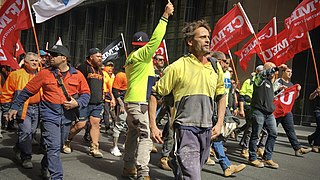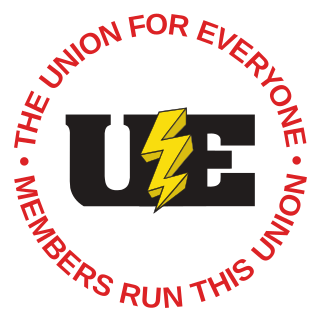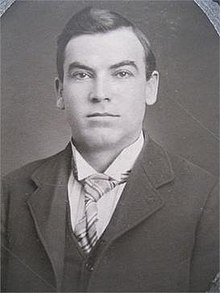
The Clayton Antitrust Act of 1914, is a part of United States antitrust law with the goal of adding further substance to the U.S. antitrust law regime; the Clayton Act seeks to prevent anticompetitive practices in their incipiency. That regime started with the Sherman Antitrust Act of 1890, the first Federal law outlawing practices that were harmful to consumers. The Clayton Act specified particular prohibited conduct, the three-level enforcement scheme, the exemptions, and the remedial measures.

The Labor Management Relations Act of 1947, better known as the Taft–Hartley Act, is a United States federal law that restricts the activities and power of labor unions. It was enacted by the 80th United States Congress over the veto of President Harry S. Truman, becoming law on June 23, 1947.

Newton is the county seat of, and most populous city in, Jasper County, Iowa, United States. Located 30 miles (48 km) east of Des Moines, Newton is in Central Iowa. As of the 2020 Census, the city population was 15,760. It is the home of Iowa Speedway, Maytag Dairy Farms, and the Iowa Sculpture Festival.

Strike action, also called labor strike, labour strike, or simply strike, is a work stoppage caused by the mass refusal of employees to work. A strike usually takes place in response to employee grievances. Strikes became common during the Industrial Revolution, when mass labor became important in factories and mines. As striking became a more common practice, governments were often pushed to act. When government intervention occurred, it was rarely neutral or amicable. Early strikes were often deemed unlawful conspiracies or anti-competitive cartel action and many were subject to massive legal repression by state police, federal military power, and federal courts. Many Western nations legalized striking under certain conditions in the late 19th and early 20th centuries.

The Maytag Corporation is an American home and commercial appliance company owned by Whirlpool Corporation since April 2006.

Picketing is a form of protest in which people congregate outside a place of work or location where an event is taking place. Often, this is done in an attempt to dissuade others from going in, but it can also be done to draw public attention to a cause. Picketers normally endeavor to be non-violent. It can have a number of aims, but is generally to put pressure on the party targeted to meet particular demands or cease operations. This pressure is achieved by harming the business through loss of customers and negative publicity, or by discouraging or preventing workers or customers from entering the site and thereby preventing the business from operating normally.

The United Electrical, Radio and Machine Workers of America (UE), is an independent democratic rank-and-file labor union representing workers in both the private and public sectors across the United States.

The Minneapolis general strike of 1934 grew out of a strike by Teamsters against most of the trucking companies operating in Minneapolis, the major distribution center for the Upper Midwest. The strike began on May 16, 1934 in the Market District. The worst single day was Friday, July 20, called "Bloody Friday", when police shot at strikers in a downtown truck battle, killing two and injuring 67. Ensuing violence lasted periodically throughout the summer. The strike was formally ended on August 22.

Canadian labour law is that body of law which regulates the rights, restrictions, and obligations of trade unions, workers, and employers in Canada.
Frederick Louis Maytag I also known as F. L. Maytag, founded the Maytag Company, which eventually became the Maytag Corporation which was acquired by the Whirlpool Corporation in 2006.
Thornhill v. Alabama, 310 U.S. 88 (1940), is a US labor law case of a United States Supreme Court. It reversed the conviction of the president of a local union for violating an Alabama statute that prohibited only labor picketing. Thornhill was peaceably picketing his employer during an authorized strike when he was arrested and charged. In reaching its decision, Associate Justice Frank Murphy wrote for the Supreme Court that the free speech clause protects speech about the facts and circumstances of a labor dispute. The statute in the case prohibited all labor picketing, but Thornhill added peaceful labor picketing to the area protected by free speech.
The Toledo Auto-Lite strike was a strike by a federal labor union of the American Federation of Labor (AFL) against the Electric Auto-Lite company of Toledo, Ohio, from April 12 to June 3, 1934.
The Remington Rand strike of 1936–1937 was a strike by a federal union affiliated with the American Federation of Labor (AFL) against the Remington Rand company. The strike began in May 1936 and ended in April 1937, although the strike settlement would not be fully implemented until mid-1940.
Samuel Pollock was an American labor union activist and leader. He helped lead two important strikes in 1934, the Auto-Lite Strike and the Hardin County onion pickers strike, before becoming district president of the Amalgamated Meat Cutters and Butcher Workmen of North America.

The Salad Bowl strike was a series of strikes, mass pickets, boycotts and secondary boycotts that began on August 23, 1970 and led to the largest farm worker strike in U.S. history. The strike was led by the United Farm Workers against the International Brotherhood of Teamsters. The Salad Bowl strike was only in part a jurisdictional strike, for many of the actions taken during the event were not strikes. The strike led directly to the passage of the California Agricultural Labor Relations Act in 1975.
National Labor Relations Board v. Fansteel Metallurgical Corporation, 306 U.S. 240 (1939), is a United States Supreme Court case on labor laws in which the Court held that the National Labor Relations Board had no authority to order an employer to reinstate workers fired after a sit-down strike, even if the employer's illegal actions triggered that strike.

The Congress of Industrial Organizations (CIO) was a federation of unions that organized workers in industrial unions in the United States and Canada from 1935 to 1955. Originally created in 1935 as a committee within the American Federation of Labor (AFL) by John L. Lewis, a leader of the United Mine Workers (UMW), and called the Committee for Industrial Organization. Its name was changed in 1938 when it broke away from the AFL. It focused on organizing unskilled workers, who had been ignored by most of the AFL unions.
The Empire Zinc strike, also known as the Salt of the Earth strike, was a 15-month-long miners' strike in Grant County, New Mexico against the Empire Zinc Company for its discriminatory pay. The strike drew national attention, and after it was settled in 1952, a movie entitled Salt of the Earth (1954) was released that offered a fictionalized version of events.
Goldfinger v. Feintuch was a 1936/1937 New York court case that set a legal precedent in the area of labor law, namely that union members were free to peacefully protest, at the retail location, the retail sale of wholesale products that were manufactured by non-union employees.
Nathan Greene, also known as "Nuddy" Greene, was an American lawyer and legal scholar. He cofounded the International Juridical Association and cowrote The Labor Injunction with his professor and future Supreme Court Justice Felix Frankfurter. The book criticized the U.S. Supreme Court for creating "government by injunction".











